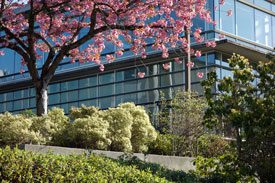
Campus Planning and Facilities is committed to sustainable practices and standards across all areas of operation in support of BCIT’s vision and commitment to integrating sustainability into the Institute.
Here are some of the practices and standards that we currently employ:
Energy And Greenhouse Gas Management
The BCIT Energy Team is tasked with reducing Institute greenhouse gas emissions through strategic energy management projects.
Maintenance Planning And Trades Services
Facilities Services is working towards implementing LEED for Existing Buildings: Operations and Maintenance. LEED for Existing Buildings allows Facilities staff to evaluate operations, improvements and maintenance with the goal of maximizing operational efficiency while minimizing environmental impacts.
Integrated Design Standards (IDS) are also applied to maintenance projects and major equipment upgrading and replacement initiatives. IDS ensures that energy performance characteristics, life cycle impacts, cost effectiveness, serviceability and reliability are all key considerations when selecting replacement systems and equipment. Lowest initial cost is not always the appropriate solution.
Custodial
Custodial services follow a LEED for Existing Buildings: Green Cleaning program in the SW1 Gateway Building. Plans are underway to deploy the program across all five campuses. The program only permits use of environmentally approved cleaning products. The intent is to reduce the use of chemicals and toxins that can hurt human health, building finishes, indoor air quality and the environment.
Waste Management
Effective waste management is the result of the following initiatives:
- Waste reduction and diversion through recycling and composting.
- Extensive recycling program, including on-site collecting and sorting.
- Vermi-composting treatment of organic materials.
Grounds, landscaping And Pest Control
Our sustainable approach to grounds, landscaping and pest control includes:
- Green landscaping practices that limit the number and type of pesticides permitted.
- Vermi-composting landscaping waste on-site.
- Maintaining and enhancing Guichon Creek for environmental and habitat protection purposes.
- An integrated pest management system.
New Buildings
Project Services targets Leadership in Energy and Environmental Design (LEED) Gold, or equivalent, standard for all new, Ministry funded, buildings. LEED is a third-party certification program and an internationally accepted benchmark for the design, construction, and operation of high performance green buildings. LEED Gold is obtained when a project earns 39 – 51 points on the rating system.
Long Range Plans
Campus development produces long range plans based on sustainable land use principles that will guide the Institute to a greener and more efficient campus. By providing a sound planning framework for future campus development, our long range plans seek to:
- Encourage compact development and efficient land use.
- Increase alternative modes of transportation by improving pedestrian, cycling and transit infrastructure.
- Protect and improve habitat areas and natural landscapes.
- Reduce the amount of land dedicated to surface parking.
- Enhance the public realm to improve community engagement and sense of place.
- Respond to environmental conditions with appropriate building massing and urban form to better manage storm water, ventilation, natural lighting and solar gain.
- Expand the campus community through a broader mix of educational, commercial and residential opportunities.
- Enhance quality educational facilities through a balanced investment in new facilities and adaptive renewal of existing buildings.
Living Lab
The Living Lab is a pan-institutional approach to applied learning that uses the campus as a vehicle to engage students, faculty and staff in resolving real world challenges.
Facilities and Campus Development supports this initiative and has participated in approximately 34 Living Lab projects since 2016.
In 2013, the Institute established a Living Lab Implementation Task Group to develop formal project procedures and protocols. Facilities and Campus Development staff are participating in the Task Group review and look forward to sponsoring future Living Lab projects that support the Institute’s core business needs and respect defined timelines and resources.
Sustainability At BCIT
Find out more about other sustainability initiatives at the BCIT Sustainability Website.